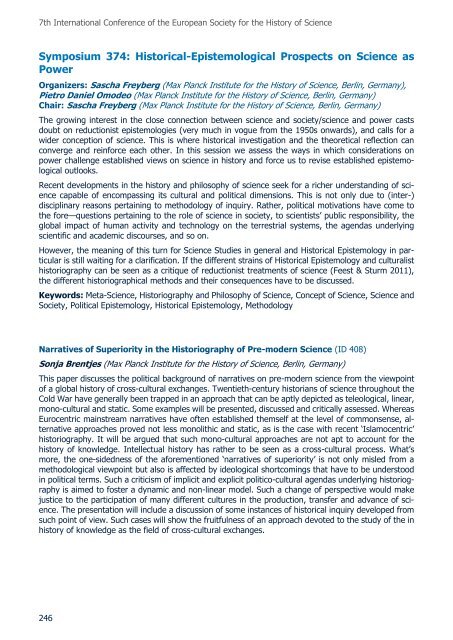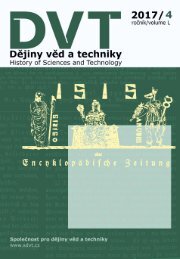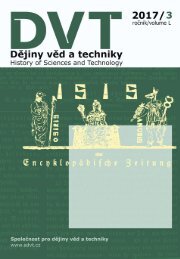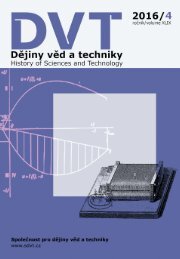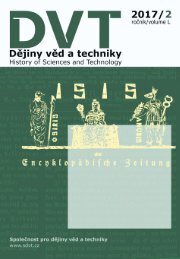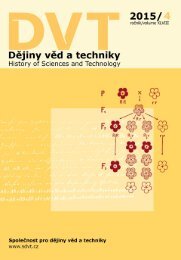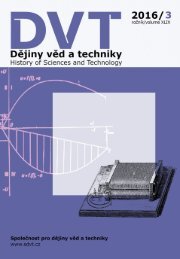- Page 1:
7 th ESHS Conference Prague 2016 7
- Page 4 and 5:
ISBN 978-80-270-0501-7
- Page 6 and 7:
7th International Conference of the
- Page 8 and 9:
7th International Conference of the
- Page 10 and 11:
7th International Conference of the
- Page 12 and 13:
7th International Conference of the
- Page 14 and 15:
7th International Conference of the
- Page 16 and 17:
7th International Conference of the
- Page 18 and 19:
7th International Conference of the
- Page 20 and 21:
7th International Conference of the
- Page 22 and 23:
7th International Conference of the
- Page 24 and 25:
7th International Conference of the
- Page 26 and 27:
7th International Conference of the
- Page 28 and 29:
7th International Conference of the
- Page 30 and 31:
7th International Conference of the
- Page 32 and 33:
7th International Conference of the
- Page 34 and 35:
7th International Conference of the
- Page 36 and 37:
7th International Conference of the
- Page 38 and 39:
7th International Conference of the
- Page 40 and 41:
7th International Conference of the
- Page 42 and 43:
7th International Conference of the
- Page 44 and 45:
7th International Conference of the
- Page 46 and 47:
7th International Conference of the
- Page 48 and 49:
7th International Conference of the
- Page 50 and 51:
7th International Conference of the
- Page 52 and 53:
7th International Conference of the
- Page 54 and 55:
7th International Conference of the
- Page 56 and 57:
7th International Conference of the
- Page 58 and 59:
7th International Conference of the
- Page 60 and 61:
7th International Conference of the
- Page 62 and 63:
7th International Conference of the
- Page 64 and 65:
7th International Conference of the
- Page 66 and 67:
7th International Conference of the
- Page 68 and 69:
7th International Conference of the
- Page 70 and 71:
7th International Conference of the
- Page 72 and 73:
7th International Conference of the
- Page 74 and 75:
7th International Conference of the
- Page 76 and 77:
7th International Conference of the
- Page 78 and 79:
7th International Conference of the
- Page 80 and 81:
7th International Conference of the
- Page 82 and 83:
7th International Conference of the
- Page 84 and 85:
7th International Conference of the
- Page 86 and 87:
7th International Conference of the
- Page 88 and 89:
7th International Conference of the
- Page 90 and 91:
7th International Conference of the
- Page 92 and 93:
7th International Conference of the
- Page 94 and 95:
7th International Conference of the
- Page 96 and 97:
7th International Conference of the
- Page 98 and 99:
7th International Conference of the
- Page 100 and 101:
7th International Conference of the
- Page 102 and 103:
7th International Conference of the
- Page 104 and 105:
7th International Conference of the
- Page 106 and 107:
7th International Conference of the
- Page 108 and 109:
7th International Conference of the
- Page 110 and 111:
7th International Conference of the
- Page 112 and 113:
7th International Conference of the
- Page 114 and 115:
7th International Conference of the
- Page 116 and 117:
7th International Conference of the
- Page 118 and 119:
7th International Conference of the
- Page 120 and 121:
7th International Conference of the
- Page 122 and 123:
7th International Conference of the
- Page 124 and 125:
7th International Conference of the
- Page 126 and 127:
7th International Conference of the
- Page 128 and 129:
7th International Conference of the
- Page 130 and 131:
7th International Conference of the
- Page 132 and 133:
7th International Conference of the
- Page 134 and 135:
7th International Conference of the
- Page 136 and 137:
7th International Conference of the
- Page 138 and 139:
7th International Conference of the
- Page 140 and 141:
7th International Conference of the
- Page 142 and 143:
7th International Conference of the
- Page 144 and 145:
7th International Conference of the
- Page 146 and 147:
7th International Conference of the
- Page 148 and 149:
7th International Conference of the
- Page 150 and 151:
7th International Conference of the
- Page 152 and 153:
7th International Conference of the
- Page 154 and 155:
7th International Conference of the
- Page 156 and 157:
7th International Conference of the
- Page 158 and 159:
7th International Conference of the
- Page 160 and 161:
7th International Conference of the
- Page 162 and 163:
7th International Conference of the
- Page 164 and 165:
7th International Conference of the
- Page 166 and 167:
7th International Conference of the
- Page 168 and 169:
7th International Conference of the
- Page 170 and 171:
7th International Conference of the
- Page 172 and 173:
7th International Conference of the
- Page 174 and 175:
7th International Conference of the
- Page 176 and 177:
7th International Conference of the
- Page 178 and 179:
7th International Conference of the
- Page 180 and 181:
7th International Conference of the
- Page 182 and 183:
7th International Conference of the
- Page 184 and 185:
7th International Conference of the
- Page 186 and 187:
7th International Conference of the
- Page 188 and 189:
7th International Conference of the
- Page 190 and 191:
7th International Conference of the
- Page 192 and 193:
7th International Conference of the
- Page 194 and 195:
7th International Conference of the
- Page 196 and 197: 7th International Conference of the
- Page 198 and 199: 7th International Conference of the
- Page 200 and 201: 7th International Conference of the
- Page 202 and 203: 7th International Conference of the
- Page 204 and 205: 7th International Conference of the
- Page 206 and 207: 7th International Conference of the
- Page 208 and 209: 7th International Conference of the
- Page 210 and 211: 7th International Conference of the
- Page 212 and 213: 7th International Conference of the
- Page 214 and 215: 7th International Conference of the
- Page 216 and 217: 7th International Conference of the
- Page 218 and 219: 7th International Conference of the
- Page 220 and 221: 7th International Conference of the
- Page 222 and 223: 7th International Conference of the
- Page 224 and 225: 7th International Conference of the
- Page 226 and 227: 7th International Conference of the
- Page 228 and 229: 7th International Conference of the
- Page 230 and 231: 7th International Conference of the
- Page 232 and 233: 7th International Conference of the
- Page 234 and 235: 7th International Conference of the
- Page 236 and 237: 7th International Conference of the
- Page 238 and 239: 7th International Conference of the
- Page 240 and 241: 7th International Conference of the
- Page 242 and 243: 7th International Conference of the
- Page 244 and 245: 7th International Conference of the
- Page 248 and 249: 7th International Conference of the
- Page 250 and 251: 7th International Conference of the
- Page 252 and 253: 7th International Conference of the
- Page 254 and 255: 7th International Conference of the
- Page 256 and 257: 7th International Conference of the
- Page 258 and 259: 7th International Conference of the
- Page 260 and 261: 7th International Conference of the
- Page 262 and 263: 7th International Conference of the
- Page 264 and 265: 7th International Conference of the
- Page 266 and 267: 7th International Conference of the
- Page 268 and 269: 7th International Conference of the
- Page 270 and 271: 7th International Conference of the
- Page 272 and 273: 7th International Conference of the
- Page 274 and 275: 7th International Conference of the
- Page 276 and 277: 7th International Conference of the
- Page 278 and 279: 7th International Conference of the
- Page 280 and 281: 7th International Conference of the
- Page 282 and 283: 7th International Conference of the
- Page 284 and 285: 7th International Conference of the
- Page 286 and 287: 7th International Conference of the
- Page 288 and 289: 7th International Conference of the
- Page 290 and 291: 7th International Conference of the
- Page 292 and 293: 7th International Conference of the
- Page 294 and 295: 7th International Conference of the
- Page 296 and 297:
7th International Conference of the
- Page 298 and 299:
7th International Conference of the
- Page 300 and 301:
7th International Conference of the
- Page 302 and 303:
7th International Conference of the
- Page 304 and 305:
7th International Conference of the
- Page 306 and 307:
7th International Conference of the
- Page 308 and 309:
7th International Conference of the
- Page 310 and 311:
7th International Conference of the
- Page 312 and 313:
7th International Conference of the
- Page 314 and 315:
7th International Conference of the
- Page 316 and 317:
7th International Conference of the
- Page 318 and 319:
7th International Conference of the
- Page 320 and 321:
7th International Conference of the
- Page 322 and 323:
7th International Conference of the
- Page 324 and 325:
7th International Conference of the
- Page 326 and 327:
7th International Conference of the
- Page 328 and 329:
7th International Conference of the
- Page 330 and 331:
7th International Conference of the
- Page 332 and 333:
7th International Conference of the
- Page 334 and 335:
7th International Conference of the
- Page 336 and 337:
7th International Conference of the
- Page 338 and 339:
7th International Conference of the
- Page 340 and 341:
7th International Conference of the
- Page 342 and 343:
7th International Conference of the
- Page 344 and 345:
7th International Conference of the
- Page 346 and 347:
7th International Conference of the
- Page 348 and 349:
7th International Conference of the
- Page 350 and 351:
7th International Conference of the
- Page 352 and 353:
7th International Conference of the
- Page 354 and 355:
7th International Conference of the
- Page 356 and 357:
7th International Conference of the
- Page 358 and 359:
7th International Conference of the
- Page 360 and 361:
7th International Conference of the
- Page 362 and 363:
7th International Conference of the
- Page 364 and 365:
7th International Conference of the
- Page 366 and 367:
7th International Conference of the
- Page 368 and 369:
7th International Conference of the
- Page 370 and 371:
7th International Conference of the
- Page 372:
Book of Abstracts 7th International


